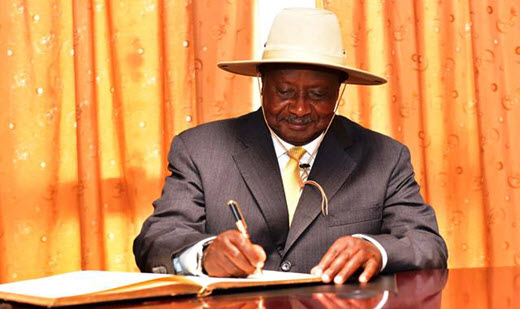President Yoweri Museveni assented to the Data Protection and Privacy Act, paving the way for authorities to maintain sanity in the use of electronic media services.
The law, which expands the mandate of the National Information Authority Uganda (NITA-U), will protect the privacy of the individual and of personal data by regulating the collection and processing of personal information.
With the Data Protection and Privacy Law, authorities will be able to protect the privacy of the individual and personal data, regulate the collection and processing of personal information and provide for the rights of the persons whose data is collected.
They will also be able to provide obligations of data collectors and data processors and regulate the use or disclosure of personal information and for related matters.
James Saaka, the Executive Director at NITA-U applauded the signing of the law as a move that will secure citizens as Government moves to bring all services online and promote Growth in the IT sector.
“The Data Protection and Privacy Law provides the much-needed protection for personally identifiable information which is key in this digital age. It provides important safeguards that will protect Ugandan citizens as they use online services,’’ Saaka explained.
Must read: Uganda ranked number one in cybersecurity management
“This law also provides many avenues to facilitate growth in the IT sector. A good example is the BPO industry where the law makes it possible for Ugandan players to comply with international standards, improving credibility and customer trust, which inevitably leads to more business.”
The Data Protection and Privacy Law will add another firm layer to securing Uganda’s cyberspace.
Uganda was recently ranked as the most secure cyberspace in Africa in the recently announced Global National Cyber Security Index. The National Cyber Security Index is a global index which measures preparedness of countries to prevent cyber threats and manage cyber incidents.
The Data Protection and Privacy law is an addition to the laws that NITA-U already regulates namely: the Electronic Transactions Act, the Electronic Signatures Act, the Computer Misuse Act, and the NITA-U Act.
The Data Protection and Privacy Bill, was on December 6, 2018 passed by the Parliament of Uganda and was awaiting be assented to by the President to become law.
The new law will operationalize Article 27 (2) of the 1995 Constitution for the Republic of Uganda which protects the right to privacy.
Related:
Vehicle tracking in Uganda: Will privacy laws prevail?
Opinion: How digital data can be used to support sustainable devt, humanitarian action

